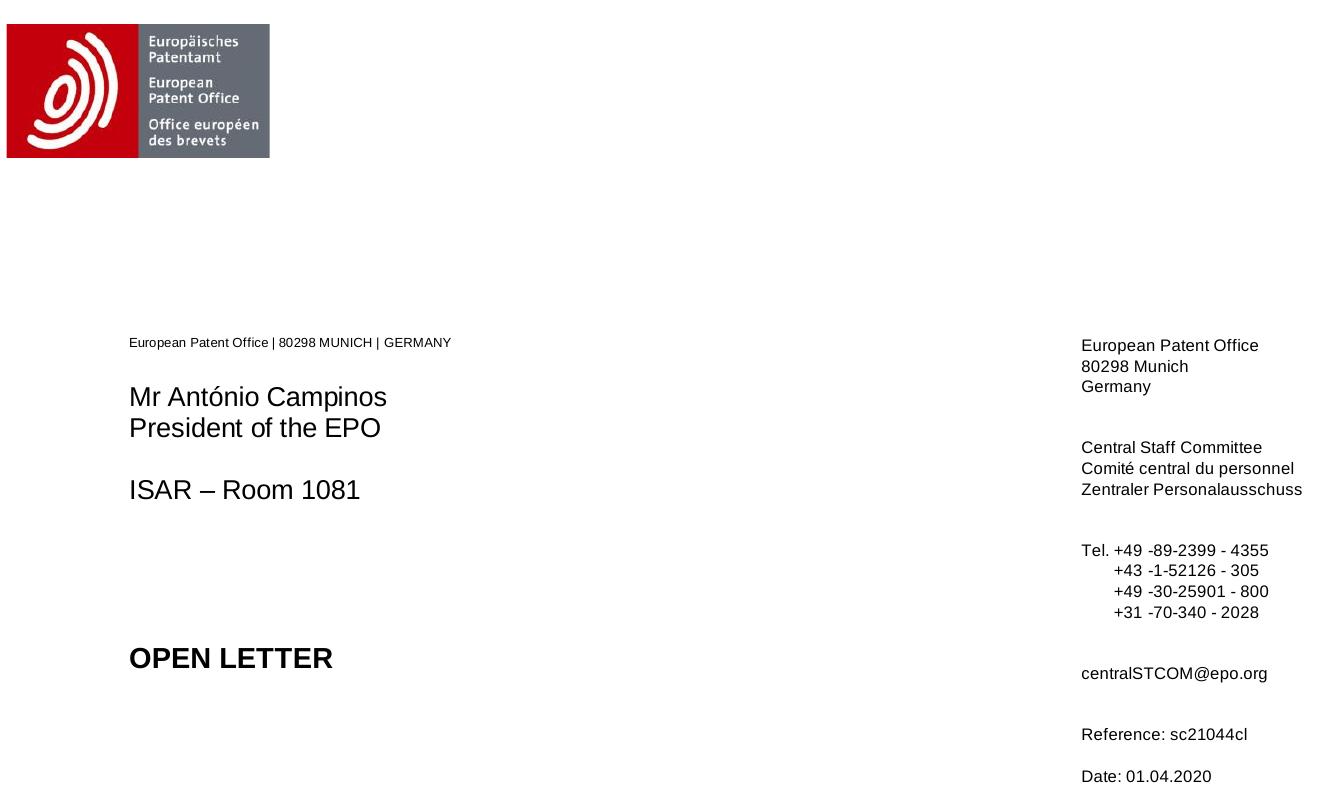

THE Salary Adjustment Procedure (SAP) is a misnomer or a euphemism for crackdown on patent examiners past and present. The crackdown started with Benoît Battistelli, who in effect began looting the institution. Systematically, undeterred. Nobody holds them accountable for it!
 "It is hardly surprising that many colleagues and pensioners (at least 1.200 requesters) are now taking legal action against the new Salary Adjustment Procedure," the Central Staff Committee (CSC) of the EPO wrote this month. "We understand from a President’s [António Campinos] letter of 25 March that he intends to reject the requests for review and he is already planning the next step of requesting a test-case procedure at the internal Appeals Committee. In this reply to his letter, we explain why we are currently reluctant to recommend to staff to identify test appellants. However, we are interested in contributing to the proper administration of justice. We would therefore be willing to support a bona fide proposal to the AC leading to a decision that the result of the litigation on the salary adjustment procedure will be applied to all employees and former employees of the EPO as well as their successors in title."
"It is hardly surprising that many colleagues and pensioners (at least 1.200 requesters) are now taking legal action against the new Salary Adjustment Procedure," the Central Staff Committee (CSC) of the EPO wrote this month. "We understand from a President’s [António Campinos] letter of 25 March that he intends to reject the requests for review and he is already planning the next step of requesting a test-case procedure at the internal Appeals Committee. In this reply to his letter, we explain why we are currently reluctant to recommend to staff to identify test appellants. However, we are interested in contributing to the proper administration of justice. We would therefore be willing to support a bona fide proposal to the AC leading to a decision that the result of the litigation on the salary adjustment procedure will be applied to all employees and former employees of the EPO as well as their successors in title."
We're reproducing the full letter below:
European Patent Office | 80298 MUNICH | GERMANY
Mr António Campinos President of the EPO
ISAR – Room 1081
OPEN LETTER
Reference: sc21044cl Date: 01.04.2020
Your letter of 25 March 2021 – Legal proceedings on the Salary Adjustment Procedure
Dear Mr Campinos,
The Central Staff Committee (CSC) regrets that you submitted a proposal for a new salary adjustment procedure (CA/19/20) to the Administrative Council (AC) that had not found the consent of the CSC. Although a manageable number of test appellants lodged requests for reviews inter alia against the flawed consultation process on your proposal and against the resulting freeze of salaries and pensions in the second half of 2020, you still decided to submit an adjustment with effect from 1 January 2021 of salaries (CA/66/20) to the AC.
The resulting salaries and pensions are in breach of basic legal principles, such as equal treatment at different places of employment. It is easy to understand1 that the current salary scales do not reflect the coefficients of purchasing power parity in Table 6 attached to the AC decision CA/D 9/20. Furthermore, pensioners are excluded from a periodical settlement and a pay-out of a lump sum after a three-year period, in contradiction to Article 33(2)(c) EPC.
It should therefore not be surprising that many colleagues and pensioners are now taking legal action. The CSC understands from your letter that you intend to reject the requests for review and are already planning the next step of requesting a test-case procedure at the internal Appeals Committee.
The CSC has been open ever since for an agreement on its locus standi so as to
______ 1 Employees looking up their basic salary in the table for Belgium (Table 1 attached to CA/D 9/20) and multiplying this value with the coefficient of purchasing power parity for their place of employment (Table 5) will observe a higher salary than on their salary slip (or in Tables 2 to 4).
have an efficient and functioning system for the settlement of disputes. Therefore, overloading the system should definitely be avoided.
You mention in your letter that the Office is willing to apply the final outcome of the legal proceedings regarding the new salary adjustment procedure “to all staff provided they are in the same situation, in fact and law”. The CSC regrets that the wording is even more restrictive than Article 13 of the Rules of the Administrative Tribunal of the ILO allowing an intervention in a complaint if a requestor is “in a situation in fact and in law similar to that of the complainant”. (Emphasis was added to both quotes.) Furthermore, the CSC took note that you recently followed in your negative decision on the NCS for colleagues in the A4(2) grade an opinion of the Appeals Committee reading inter alia that “statements of the President ... were not, however, considered to constitute an enforceable and substantive promise made”.
Finally, the CSC cannot see a category of employees or pensioners to whom the final outcome of the legal proceedings would not apply.
In view of the above, the CSC is currently reluctant to recommend to staff to identify test appellants. However, the CSC is interested in contributing to the good administration of justice. The CSC would therefore be willing to support a bona fide proposal to the AC leading to a decision that the result of the litigation on the salary adjustment procedure will be applied to all employees and former employees of the EPO as well as their successors in title.
The CSC would further appreciate if you could exempt the staff from the obligation to exhaust the internal means of appeal by authorising them to challenge a decision directly before the Administrative Tribunal of the ILO2.
Yours sincerely,
Alain Dumont Chairman of the Central Staff Committee
______ 2 Such an approach permitted a swift access to court for the employees of the ILO, IOM, ITU, WHO and WIPO, who successfully challenged the adjustment of their salaries in 2018 and who received the Judgments Nos. 4134–4138 already one year later.